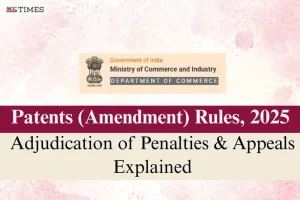On 25-11-2025, the Ministry of Commerce and Industry notified the Patents (Amendment) Rules, 2025 to amend the Patent Rules, 2003. The provisions came into force on 25-11-2025.
The amendment introduces a new chapter relating to the Adjudication of Penalties and Appeals.
Key Provisions:
-
Any person filing a complaint in respect of any contravention committed under the following provisions of the Patents Act, 1970 will have to file a complaint in Form 32 through electronic means before the adjudicating officer.
-
Unauthorized claim of patent rights;
-
Refusal or failure to supply information;
-
Practice by non-registered patent agents.
-
-
Holding of inquiry:
-
If an adjudicating officer believes someone has violated Section 124A of the Act, they must send a notice electronically. The notice will ask the person to explain why an inquiry should not be conducted. The person will have at least 7 days from the date the notice is served to respond.
-
Every notice should specify the nature of contravention that has been alleged to have been committed.
-
If, after reviewing the person’s response, the adjudicating officer decides an inquiry is needed, they will send a notice requiring the person to appear, either in person or through a lawyer, on the date specified in the notice.
-
On the date of inquiry, the adjudicating officer will have to explain to the person the nature of the contravention alleged to have been committed.
-
The adjudicating officer will give the person a fair chance to be heard and present relevant documents or evidence. If needed, the hearing will be postponed to a later date.
-
During the inquiry, the adjudicating officer can require any person who knows about the case to attend, give evidence, or provide documents that may be useful or relevant.
-
If a person fails or refuses to appear as required, the adjudicating officer can continue the inquiry without them, after recording the reasons for doing so.
-
If, after reviewing the evidence, the adjudicating officer is satisfied that the person committed the contravention, they will issue a written order imposing an appropriate penalty under the Patents Act, 1970 .
-
Each order will contain the provision of the Patents Act, 1970 of which contravention has been committed and will also contain the reasons for imposing it.
-
A copy of the order, along with other copies of proceedings, will be supplied free of cost to the person against whom the order is made.
-
The adjudicating officer will have to pass the order within 3 months from the date of issuance of the notice.
-
The adjudicating officer shall not be bound to observe the provisions of the Bharatiya Sakshya Adhiniyam, 2023.
-
-
Appeal:
-
Anyone who is unsatisfied with the adjudicating officer’s order can file an appeal in Form 33 electronically to the appellate authority within 60 days of receiving the order.
The appellate authority can accept a late appeal if there is a valid reason for the delay.
-
After receiving the appeal, the appellate authority will send a notice to the respondent to file a reply within the specified time.
-
Then, after giving both parties a fair chance to be heard, it will issue a reasoned order, which may include adjournment.
-
The proceedings will normally be completed within 6 months from the date the appeal was received.
-
-
Service of communications will be effected through electronic means only.
-
Every order must be dated, digitally signed, communicated to all parties, and uploaded on the official website.
-
All penalties collected under this chapter will be credited to the Consolidated Fund of India.

